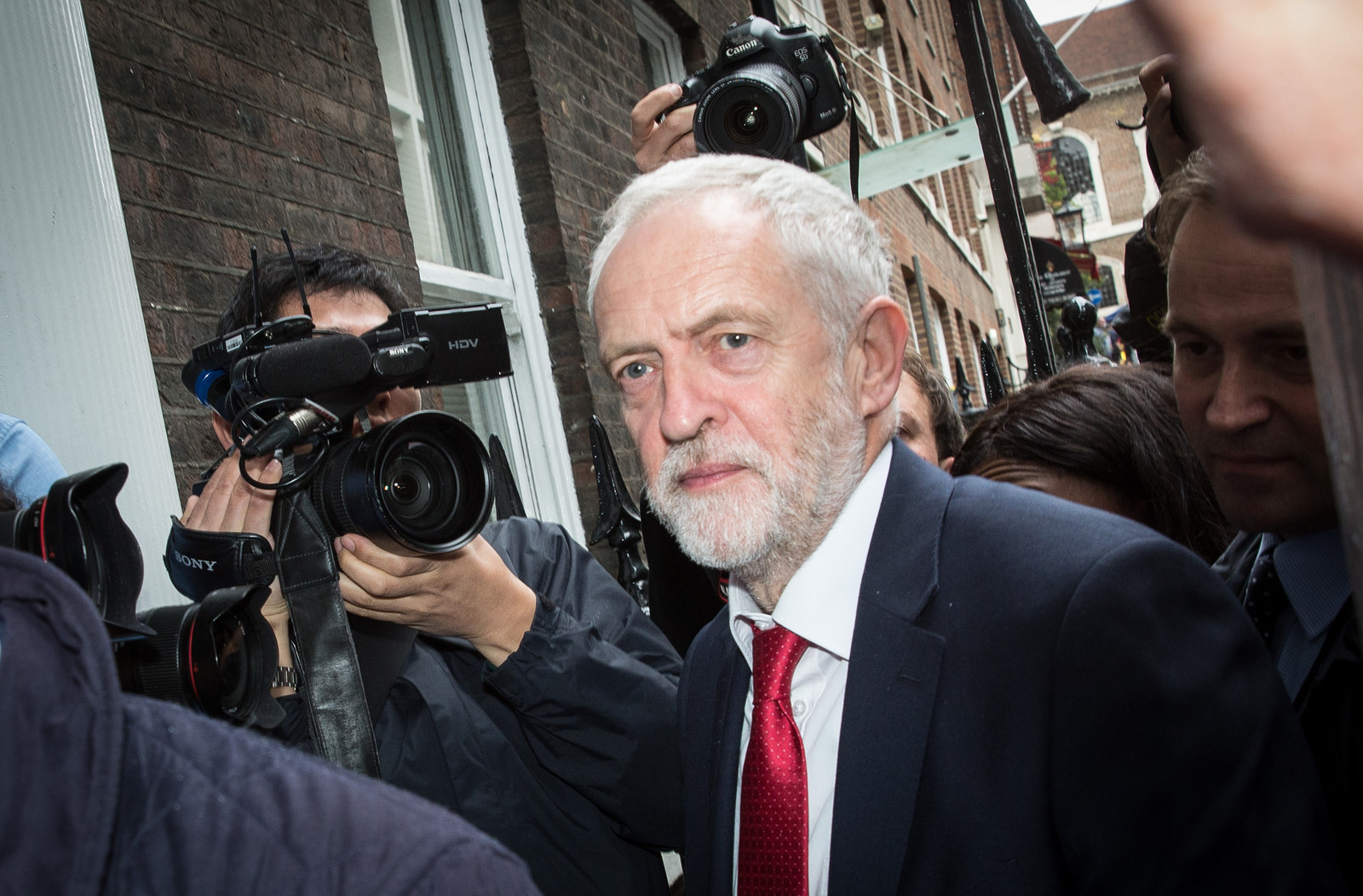Voting for justice 2017: human rights and access to justice in the party manifestos

Jeremy Corbyn: 12 May 2017 Pic: Chatham House (Flickr, Creative Comms)
Tomorrow, voters across the United Kingdom will cast their ballots in a general election which most political commentators expect will result in an increased Conservative majority. A number of different issues may be at the forefront of voters’ minds, including withdrawal from the European Union, security, living standards and public services.
Understandably in the present post-referendum, pre-Brexit political context, justice policy has not featured prominently in the election campaign. There are, however, significant differences in the parties’ policies on human rights, legal aid and access to justice which merit attention. This article aims to summarise the policies in these areas set out by the Conservatives, Labour, the Scottish National Party, the Liberal Democrats, Ukip and the Green Party in their respective manifestos.
Human rights and civil liberties
The Conservatives have for some time opposed the Human Rights Act, and the Prime Minister herself has previously advocated withdrawal from the European Convention on Human Rights (ECHR). While the party’s manifesto, Forward, Together, includes a pledge that British troops will in future not be subject to the European Court of Human Rights, it does not repeat promises by the Conservatives to ‘scrap’ the Human Rights Act.
Instead, the Conservatives confirm that they ‘will not repeal or replace the Human Rights Act while the process of Brexit is underway’, and will remain signatories to the ECHR ‘for the duration of the next parliament’. Nevertheless, they will ‘consider our human rights legal framework’ when the process of leaving the EU is concluded.
The Conservatives’ policy on human rights was, however, thrown into some doubt by Theresa May yesterday. In the wake of the Manchester and London attacks, she said that if human rights laws prevent the government from deporting or imposing new restrictions on terror suspects, the Conservatives will change those laws.
Labour pledge to retain the Human Rights Act as part of its aspiration to ‘make Britain a fair society with liberties for all, governed by the rule of law, and in which the law is enforced equally’. Their manifesto, For the many, not the few, decries cuts to the Equality and Human Rights Commission and says a Labour government will ‘enhance the powers and functions of this commission, making it truly independent’. Labour would also ‘reinstate the public sector equality duties and seek to extend them to the private sector’.
The Liberal Democrats ‘will vote against any attempts to scrap the Human Rights Act or withdraw from the European Convention on Human Rights’, and promise to strengthen the UK’s commitment to international human rights law. In Change Britain’s Future, the Lib Dems assert their belief that ‘British foreign policy and international aid should seek to promote the liberal values of human rights and democracy throughout the world’. As part of this, they would control arms exports to countries listed as ‘human rights priority countries’ by the Foreign and Commonwealth Office.
The Scottish National Party (SNP) manifesto, Stronger for Scotland, re-affirms their commitment to the ECHR and say they will ‘oppose any attempts by the UK government to scrap the Human Rights Act and withdraw the UK from the ECHR’. The SNP will also ‘urge the UK government to immediately halt all military support and arms sales to regimes suspected of violations of human rights and international humanitarian law’.
In, Britain Together, Ukip stand by their 2015 manifesto pledge to repeal ‘Labour’s Human Rights legislation and remove the UK from the jurisdiction of the European Court of Human Rights’, and to introduce a new UK Bill of Rights. Ukip also state that they will ‘protect religious freedoms in accordance with Article 18 of the Universal Declaration of Human Rights, provided those beliefs exist firmly within the framework of British law’, and ‘will not condone any faith position that is itself intolerant of the human rights of others’.
Finally, the Green Party commit to defending the Human Rights Act and UK membership of the ECHR, and to reinstate funding for the Equality and Human Rights Commission. The Greens also promise ‘a humane immigration and asylum system’ and an ‘ethical foreign policy’ which ends support for aggressive wars of intervention and stops arms sales to oppressive regimes. (Instead of a full manifesto, the Green Party has released a Green Guarantee, which updates its 2015 manifesto.)
Legal aid and access to justice
Recent years have seen significant cuts to legal aid and increases to court and tribunal fees, which have undoubtedly had a detrimental impact on access to justice, particularly in areas of law such as social welfare and employment law. Following the passage of the Legal Aid, Sentencing and Punishment of Offenders Act 2012 (LASPO) in April 2013, the Coalition government promised to review the impact of legal aid cuts within five years.
After forming a majority government in 2015, the Conservatives confirmed their intention to honour the pledge to review LASPO, and in January this year the Justice Minister, Oliver Heald, announced that the review process was to begin shortly and would be concluded by April 2018. This has been disrupted by the general election, and it is regrettable that the Conservative manifesto does not specifically guarantee that the government review of legal aid cuts will take place.
Indeed, the only mention of legal aid by the Conservatives is a vow to ‘restrict legal aid for unscrupulous law firms that issue vexatious legal claims against the armed forces’, clearly a nod to the Daily Mail’s bête noire, Phil Shiner (who has been struck off and whose firm closed down after losing its legal aid contract).
Elsewhere, in a section on ‘standing up for victims’, the Conservatives say they will ‘introduce an independent public advocate’ to act for bereaved families after a public disaster and support them at public inquests, in order to ‘ensure that the pain and suffering of the Hillsborough families over the last twenty years is not repeated’.
The scope of what this public advocate would do, and when they would act, is unclear. The manifesto also includes somewhat vague pledges to ‘continue to modernise our courts’, to make it ‘easier for people to resolve disputes and secure justice’, and to ‘explore ways to improve the family justice system’.
Labour offer significantly more – and more detail – on legal aid and access to justice, with promises to ‘re-establish early advice entitlements in the Family Courts’, reintroduce funding for preparation of judicial review cases, review the financial means tests for legal aid and to ‘consider the reinstatement’ of other areas of legal aid following the final report of the Access to Justice Commission led by Lord Bach.
On court fees, while Labour would not prohibit the courts from raising money through fees, the party would ‘introduce a ratio to establish the maximum difference between actual costs and charges levied’. The ‘rights at work’ section of the manifesto also commits the party to abolishing employment tribunal fees, which have resulted in a huge reduction in the number of discrimination and unfair dismissal claims.
The Liberal Democrats go further than Labour on court fees, with a pledge to ‘reverse the massive increases in court and tribunal fees, which prevent many from pursuing good cases’ (not just limited to fees in the employment tribunals). On legal aid, the Lib Dems would conduct an ‘urgent and comprehensive review’ of the effects of LASPO on access to justice, particularly in relation to social welfare, domestic violence and exceptional funding. Tim Farron and co also say they would ‘secure further funding for criminal legal aid from sources other than the taxpayer, including insurance for company directors, and changes to restraint orders’.
Scotland has a separate legal system to England and Wales, but in any event the SNP manifesto contains no reference to legal aid or access to justice. The Ukip manifesto and the Green Guarantee are also silent on this area, although the Green Party Justice Spokesperson, Charley Pattison, confirmed at the recent YLAL debate on access to justice that her party’s 2015 manifesto promise to reverse the LASPO legal aid cuts still stands.
YLAL invites you to email your prospective parliamentary candidates (or, after the election, your MP) to call on them to support legal aid and access to justice – see our website for a template email and details of how to find your local candidates.







